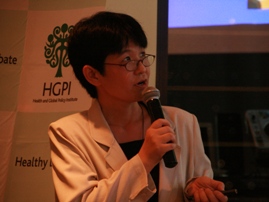(Report) 45th Breakfast Meeting
date : 9/19/2013

In May 2013, as a result of how the Hollywood actress Angelina Jolie had boldly shared her experience which she explained of how and why she had underwent mastectomy to prevent the risk of developing breast cancer in the future when she found that mutations in the BRCA1 gene were detected in the genetic testing of hereditary breast ovarian cancer via New York Times The Opinion Pages, the news had turned into a hot topic in Japan.
At almost the same time, “New prenatal diagnosis” was available for the pregnant women to determine the presence of chromosomal abnormalities in fetal blood test in April this year. As the genetic analysis technology advances, examining and predicting future disease of the baby through fetal genetic testing is made possible. However, this has also accompanied with difficult choices to make. Fear is also voiced as the technology may lead to discrimination of people with possible diseases.
We invited Chieko Tamura, the only person in Japan who holds both American and Japanese certificates as a genetic counselor to share with us the current situation and challenges of genetic counseling and genetic testing.
(medium: Japanese)
■Theme
“Why
did Angelina Jolie undergo the surgery? – a perspective of a certified
genetic counselor from both Japan and the United States with regards to
the current situation and challenges of genetic counseling and genetic
testing.”
■Speaker
Chieko Tamura
Chieko Tamura originally studied pharmaceutical science, and has a Japanese national license as a pharmacist, since 1988. After working for a pharmaceutical company for thirteen years as a basic and clinical research scientist and a product manager, she went to the U.S.A. as a Fulbright scholar and studied genetic counseling at the joint graduate program of the National Human Genome Research Institute and Johns Hopkins University School of Public Health, and graduated in 2003 getting the master’s degree. She has been certified as a genetic counselor by the American Board of Genetic Counseling as well as the Japanese Board of Genetic Counseling. She is currently the only person who holds both American and Japanese certificates as a genetic counselor, and is now a board member of the Japanese Association of Certified Genetic Counselors. After returning to Japan in 2003, she worked as a genetic counselor, at many different medical institutions, including the Japan’s National Center for Child Health and Development, several university hospitals and major fertility clinics, covering a variety of conditions, including prenatal, pediatrics, adult genetics, cancer genetics, neurogenetics, and infertility, etc. Ms. Tamura also worked as an associate professor for five years at one of the newly established genetic counseling training graduate programs at Ochanomizu University in Tokyo. She has been working as an advisor to several patient and family support groups, with Marfan syndrome, Turner syndrome, prion diseases, familial colon cancer, spinocerebellar ataxia, etc.
■Date and Time
Sep 19, 2013 8:00am-9:00am
■Venue
GARB Marunouchi (2-2-3 Marunouchi, Chiyoda-ku, Tokyo)
Exhibition date:2013-09-19
Top Research & Recommendations Posts
- [Policy Recommendations] The Path to a Sustainable Healthcare System: Three Key Objectives for Public Deliberation (January 22, 2026)
- [Research Report] The 2025 Public Opinion Survey on Healthcare in Japan (March 17, 2025)
- [Research Report] Perceptions, Knowledge, Actions and Perspectives of Healthcare Organizations in Japan in Relation to Climate Change and Health: A Cross-Sectional Study (November 13, 2025)
- [Policy Recommendations] Reshaping Japan’s Immunization Policy for Life Course Coverage and Vaccine Equity: Challenges and Prospects for an Era of Prevention and Health Promotion (April 25, 2025)
- [Research Report] AMR Policy Update #4: Cancer Care and AMR (Part 1)
- [Research Report] The 2023 Public Opinion Survey on Satisfaction in Healthcare in Japan and Healthcare Applications of Generative AI (January 11, 2024)
- [Public Comment Submission] “Assessment Report on Climate Change Impacts in Japan (Draft Overview)” (December 24, 2025)
- [Research Report] The 2026 Public Opinion Survey on Healthcare in Japan (February 13, 2026)
- [Policy Recommendations] Developing a National Health and Climate Strategy for Japan (June 26, 2024)
- [Research Report] The Public Opinion Survey on Child-Rearing in Modern Japan (Final Report) (March 4, 2022)
Featured Posts
-
2026-01-09
[Registration Open] (Hybrid Format) Dementia Project FY2025 Initiative Concluding Symposium “The Future of Dementia Policy Surrounding Families and Others Who Care for People with Dementia” (March 9, 2026)
![[Registration Open] (Hybrid Format) Dementia Project FY2025 Initiative Concluding Symposium “The Future of Dementia Policy Surrounding Families and Others Who Care for People with Dementia” (March 9, 2026)](https://hgpi.org/en/wp-content/uploads/sites/2/dementia-20260309-top.png)
-
2026-02-05
[Registration Open] (Webinar) The 141st HGPI Seminar “Current Status and Future Prospects of Korea’s Obesity Policy: Voices of People with Lived Experience in Policy Promotion” (March 3, 2026)
![[Registration Open] (Webinar) The 141st HGPI Seminar “Current Status and Future Prospects of Korea’s Obesity Policy: Voices of People with Lived Experience in Policy Promotion” (March 3, 2026)](https://hgpi.org/en/wp-content/uploads/sites/2/hs141-top-1.png)






